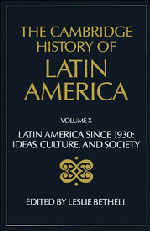Book contents
- Frontmatter
- 1 The multiverse of Latin American identity, c. 1920–c. 1970
- 2 Latin American narrative since c. 1920
- 3 Latin American poetry, c. 1920–1950
- 4 Latin American poetry since 1950
- 5 Indigenous literatures and cultures in twentieth-century Latin America
- 6 Latin American music, c. 1920—c. 1980
- 7 Latin American architecture, c. 1920–c. 1980
- 8 Latin American art since c. 1920
- 9 Latin American cinema
- 10 Latin American broadcasting
- Bibliographical essays
- References
10 - Latin American broadcasting
Published online by Cambridge University Press: 28 March 2008
- Frontmatter
- 1 The multiverse of Latin American identity, c. 1920–c. 1970
- 2 Latin American narrative since c. 1920
- 3 Latin American poetry, c. 1920–1950
- 4 Latin American poetry since 1950
- 5 Indigenous literatures and cultures in twentieth-century Latin America
- 6 Latin American music, c. 1920—c. 1980
- 7 Latin American architecture, c. 1920–c. 1980
- 8 Latin American art since c. 1920
- 9 Latin American cinema
- 10 Latin American broadcasting
- Bibliographical essays
- References
Summary
introduction
On 27 August 1920 four Argentine medical students broadcast Wagner’s Parsifal from the roof of the Coliseo theatre in Buenos Aires. The next day a newspaper observed that the twenty families who received the opera on their radio sets probably thought Wagner’s divine music came directly from heaven. The transmission was one of the most important events in the cultural history of Latin America in the twentieth century. It marked the advent of broadcasting and the modern mass media in the region.
During the 1920s visionary pioneers introduced radio into almost every country in Latin America. Experimental broadcasts began in Mexico in 1921. N. H. Slaughter, a Westinghouse engineer, and two assistants installed the first radio transmitter in Brazil in 1922 on top of the Corcovado mountain overlooking Rio de Janeiro. At the exhibition grounds where the city was celebrating the hundredth anniversary of Brazilian independence, trumpet-shaped loudspeakers blasted out O Aventureiro from the performance of Carlos Gomes’ opera O Guarani at the Teatro Municipal (as well as popular hits like Yes, We have no Bananas). Newspapers reported the reception was so good you could hear the audience applaud. A year later the first Brazilian radio station, equipped by Western Electric, went on the air with the motto: ‘To work for the culture of those who live in our country and for the progress of Brazil’. Cuba also set up its first radio station in 1922 under the auspices of the International Telephone and Telegraph Company (IT&T).
- Type
- Chapter
- Information
- The Cambridge History of Latin America , pp. 519 - 568Publisher: Cambridge University PressPrint publication year: 1995
References
- 7
- Cited by



